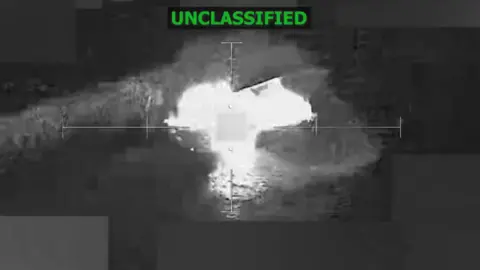Trump's Boat Strike Campaign: An Overview of Operation Southern Spear
US airstrikes against alleged drug boats in the Caribbean and eastern Pacific have continued unabated since early September - a deadly campaign now dubbed Operation Southern Spear.
Tens of thousands of troops and substantial air and naval assets have been deployed to the region, forming the largest US military presence in Latin America in decades. The campaign has its roots in the Trump administration's strategy to counter drug trafficking and secure the US border.

On Sunday, the US military confirmed that the world's largest aircraft carrier, the USS Gerald R. Ford, had arrived in the Caribbean, signaling an increase in military readiness. Officials argue these strikes are necessary to stop the influx of drugs that harm American citizens.
However, the operation has drawn criticism and fears of a wider conflict, particularly with Venezuela, where multiple strikes have raised legal questions. Critics argue about the potential for striking civilians and the legality of the operation under international law. Legal experts have warned that these strikes may constitute violations.
Rationale Behind the Strikes
President Trump and officials cite the strikes as essential defensive actions against drug cartels, framing them as a necessary step in preserving American lives. The campaign aims to eliminate narco-terrorists from the region while providing little specific information on those targeted. This has been further complicated by the association of some targets with foreign terrorist organizations.
Military Presence and Legal Implications
With 15 warships deployed in the Caribbean, the US military maintains a potent presence capable of striking quickly. Yet, the legal basis for the strikes remains under scrutiny, with some experts suggesting that these could be treated as crimes against humanity.
Future of the Campaign
The increasing intensity and scale of airstrikes have sparked fears regarding US intentions toward Venezuela, especially as Maduro's government prepares for potential conflict. The situation evolves as the Trump administration continues its operations, navigating criticism and regional tensions.


















